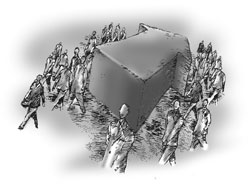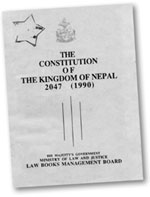 Reforms to the 1990 Constitution are being called for from all political directions. The Maoists want a Constituent Assembly to be set up for this purpose. Some want a referendum on the question "Constitutional Reforms or Constituent Assembly?" Still others wish a re-negotiation by and between the king, parliamentary parties and the Maoists, representing the dominant ideologies and centres of power.
Reforms to the 1990 Constitution are being called for from all political directions. The Maoists want a Constituent Assembly to be set up for this purpose. Some want a referendum on the question "Constitutional Reforms or Constituent Assembly?" Still others wish a re-negotiation by and between the king, parliamentary parties and the Maoists, representing the dominant ideologies and centres of power. And then there are those who wish that reforms be undertaken by the ruling party while negotiating with the Maoists for and on behalf of all other parties, without altering the fundamentals of the present system, namely constitutional monarchy, multi-party parliamentary democracy with sovereignty residing in the people.
The demands for change are wide and varied:
- the state should be secular, albeit with a Hindu monarch and duly recognising the multi-ethnic, multi-religious, multi-lingual fabric of society;
- an electoral democracy be founded on free and fair elections by forming an interim government to oversee elections;
- the prime minister can go to test the people's will whenever he deems it necessary;
- political parties be bound by due process of the rule of law and not function as extra-constitutional bodies;
- the system of castes, outcastes and gender inequality imbibed in the traditional law of the land (Muluki Ain) be re-engineered;
- representative democracy must protect and promote human rights and minority rights;
- the body politic must be cleansed of corruption;
- the prime minister needs more executive privileges as he is otherwise hostage to parliamentary politics;
- electoral democracy has been weakened by muscle-power, money-power and the invisible hand of the mafia.
In addition to the core principles laid down by the constitution, there are others that need to be enunciated: that Nepal is "nations-within-the-state" and not just a "nation-state". This means that our structure of governance must be unitary, with federal features.
 Our constitution is based on the Westminster model, giving rise to the phenomenon of majority, minority and coalition governments, with the attendant political instability that contributed to the rise of the Maoists. There is also a proposal for a \'national' government" to collectively deal with the demands of the state of emergency and its prolongation.
Our constitution is based on the Westminster model, giving rise to the phenomenon of majority, minority and coalition governments, with the attendant political instability that contributed to the rise of the Maoists. There is also a proposal for a \'national' government" to collectively deal with the demands of the state of emergency and its prolongation. The Anglo-Saxon winner-take-all system of voting has not gone down well, as the parties in opposition resort to bandhs and walkouts to exact compliance or concessions from the executive. Then there is the unique phenomenon of party factionalism where, for want of a common ideology parliamentarians, rally around personalities and have no qualms about splitting parties, hence the jumbo cabinets. Parliamentarians are also found to be disinterested in or unqualified to delve into the intricacies of lawmaking, as well as monitoring the implementation of existing laws.
The simplest measure of reform is, it is believed, to have parliament enact a law to govern limits on funding for political parties and call for audits, accountability, and good party governance. Another would be to have parliament require that all constitutional organs of state, as well as the chiefs of central security, the judiciary, and the civil service, be empowered to play their executive leadership roles. The state desperately needs an autonomous public service that is beholden to the rule of law, not committed to the rulers, as in the past. All heads of constitutional organs should be subject to impeachment by parliament. Equally simple, as it can be done within the present constitution, is to reduce the number of ministries. The creation of new departments should not be allowed unless it is mandated by an act of parliament.
And how about requiring the effective separation of the powers of the executive and legislature and, to promote party unity centred around its ideology and its parliamentary leader, MPs should be disallowed constitutionally from being ministers. Let the prime minister, elected by the Lower House, have the freedom to appoint anyone from inside or outside his party-other than an MP-to the position of minister. The main duty of an MP must be to govern, not play party politics.
It would also be a relatively simple matter to accept constitutional changes that provide for an interim government to manage the affairs of state, led by the king, with a few ministerial advisers nominated by the parliamentary parties.
If constitutional reforms are needed after all this, then they need to be part of a quest to re-structure the democratic system and re-engineer the democratic process. For democracy to be meaningful to the people at the grassroots, decentralisation is the key. Principles governing \'devolution', \'de-concentration', \'deregulation' and \'delegation' should be well spelt out to promote modern concepts of \'community sovereignty', and enshrined in the reformed Constitution. This can be enhanced through the incorporation of the principle of local referenda, so the local people can decide on all critical subjects related to local self-governance. The real challenge to remaking the constitution will be to innovate at the Village Development Committee and Ward levels such that the poor have equitable access to development. The VDC and Ward chairperson and vice-chairperson could be elected on the basis of open voting for individuals in the Panchayats, based on their leadership ability.
An Upper House that replicates the Lower House is a waste of national resources, especially when it is a repository of candidates who have lost their elections or are unfit to be elected. A bicameral parliament should be designed to provide adequate checks and balances to the Lower House by representing the plurality of society. This way, lawmaking and review, as well as national policies, would have the voice of the most non-partisan interests, and be geared to longer-term considerations than is possible in the debates of the Lower House. Excessive lobbying by organised vested interests would also be controlled.
A National Security Council (NSC) is a strategic must and should be built into the constitution as an independent organ of state. An autonomous secretariat occupied by independent scholars must be available to the NSC. The council should have a broader representation in the manner of King-in-Council to deliberate openly on national security policies, strategies and issues. Leaders of all national political parties too should be present at its proceedings, and all plenary sessions should be chaired by His Majesty the King.
The challenge is to create a society that is democratic, just, free, fair and progressive. The way ahead is to push for participatory democracy where the state mobilises the poor socially to harness their creativity, resilience and wisdom in a new social contract between the poor and the elite.
We can get out of this morass if we begin to trust each other, care for the poor, and have hope and project a vision of ourselves living peacefully and in harmony with one another in a progressive Nepali society.
(Madhukar SJB Rana is with the Institute of Development Studies in Kathmandu.)



